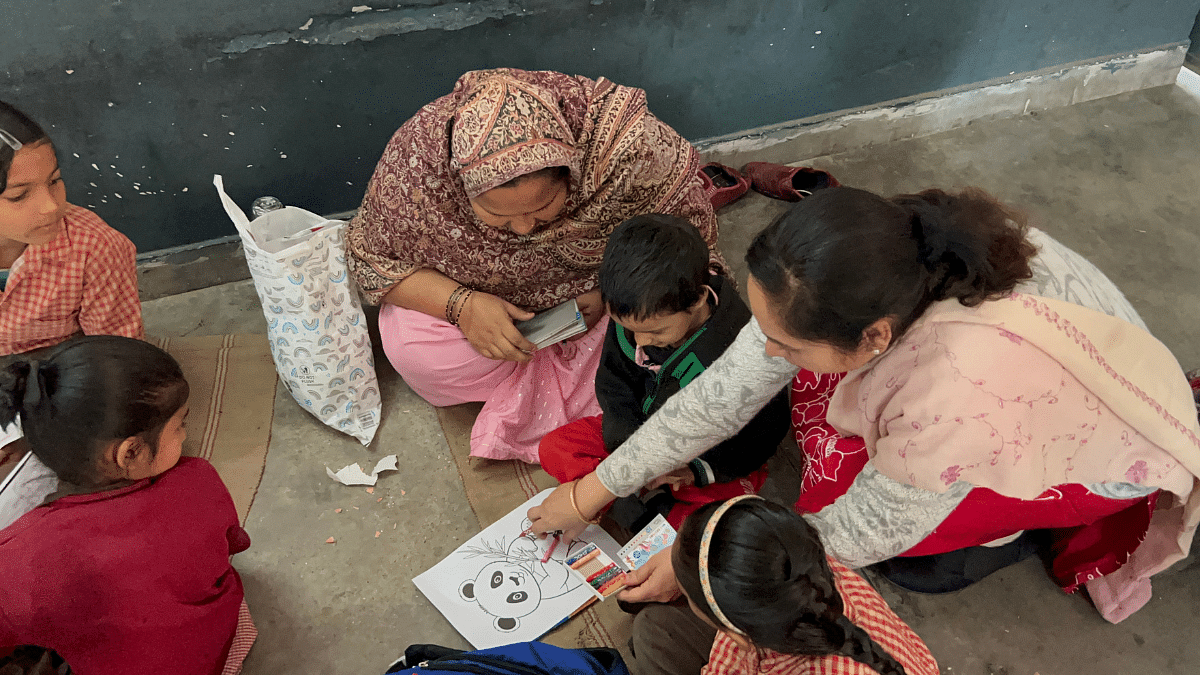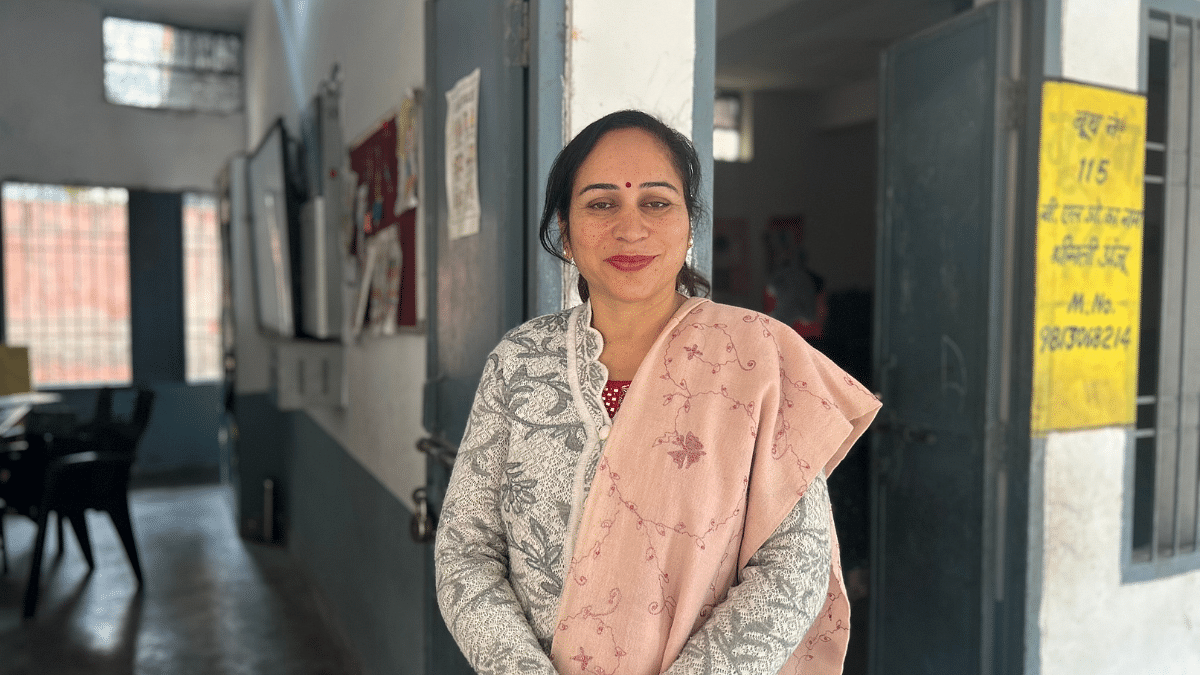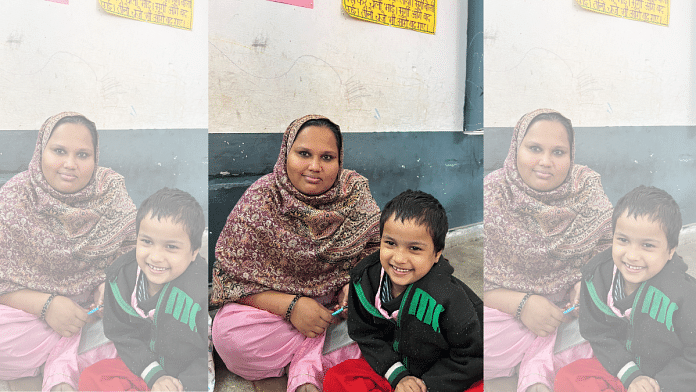Sonipat: Wheelchair-bound Shabnam Khan, 8, yearned to go to school as she watched her two elder sisters and a younger brother go through the morning ritual of getting dressed in brown uniforms and setting out. Four years later, she is finally in a classroom, and so is her mother, Soni Khan.
On a balmy winter day, a trickle of young children made their way from the busy main road to the bylane leading up to the government-run Model Sanskriti School in Sonipat. Soni and Shabnam, in her wheelchair, negotiating the dilapidated and pothole-ridden streets are hard to miss despite the crowds.
There have been several instances when passersby offered alms to Soni. “Just because she is in a wheelchair, people assume we are beggars,” a hurt Soni said. “I tell them she is a student, she goes to school.”
Shabnam’s disabilities had prompted her parents — Soni, a homemaker, 35, and Mumtyaz Khan, 40, a daily wager — to give up on the thought of educating her. But when the family sat down for dinner one evening in June and Shabnam conveyed in slow and broken sentences her wish to go to school, they decided to make it happen.
Soni was unsure if the school would admit Shabnam, but she could no longer dismiss her daughter’s yearning. “That day we decided that we couldn’t wait for her to walk someday and then educate her. It would be too late,” Soni said, breaking into tears.
The next day, Soni went to the school, where her older daughters, 11 and 10, are enrolled, to get Shabnam admitted. Teachers agreed to enrol Shabnam, but with a rider — Soni, a Class 3 dropout, had to be at the school since there is no specialised care for disabled children.
Initially, Soni would drop off Shabnam inside the classroom and wait outside to carry her to the washroom and to feed her meals during midday.

But, the classrooms and learning environment inspired the mother to take another step: to get herself educated. A week later, she joined her daughter. Both are now students of Class 2, although Soni is not formally a student. She, too, is learning to read and write.
“We sit and learn together in the class. When I am unwell and cannot do my homework, the teacher scolds me,” Soni jokingly told ThePrint.
Also Read: Bharat Atta gets thumbs up, buyers now want govt to sell tea, vegetable oils & more pulses
Support system
Shabnam is completely dependent on her for even the most basic of activities, like eating or holding a pencil, and her newfound exposure to the outside world has left her nervous, making it more difficult for her to speak in full sentences in the classroom, Soni said.
“She doesn’t even talk much but her classmates come and sit with her. I know she feels happy about that.”
Unaware of Shabnam’s medical condition, the relatives often consoled and reassured the couple that she would walk one day. But, they soon gave up and instead even told Soni that since she might never be able to walk, the family shouldn’t waste time on Shabnam and focus on their other children, something that often leaves her disheartened.
Shabnam was born with jaundice, and the family’s lack of access to healthcare led to her disabilities, doctors have told Soni. For two years Soni and Mumtyaz hoped that by some miracle Shabnam would walk again — but she didn’t.
Visits to government hospitals drained them financially, while private facilities projected treatment costs of up to Rs 1 lakh. “By the end of month, we are sometimes not even left with anything to eat, but their education is still very important to us,” Soni said, adding that Mumtyaz earns a mere Rs 12,000 a month.
“Allah made her the way she is. If it was up to us, she would not face any struggle in life,” the mother said, adding that Mumtyaz is now determined to educate their daughter for as long as they can afford and to her abilities.

Shabnam’s class teacher Aarti Singh, said children like her often feel neglected at home when their families get busy with work, often leaving them scarred. “I am not sure how much she is able to retain, but at least we see happiness on her face.”
Currently, Singh is focusing on making Shabnum’s grip stronger to enable her to hold a pencil and to interact more with teachers and classmates. Shabnam’s classmates say she has started to participate and repeat words in group classes.
“Such kids are usually very social. I believe that slowly she will start speaking properly,” Singh told ThePrint.
Teaching Shabnam and Soni together in the same class has been rewarding for Singh, who described it as an emotional and overwhelming experience.
For decades, Singh encouraged women in rural Sonipat to educate themselves. “I and a few other teachers used to go door to door and request women to attend classes, but each time we were turned down as they asked who would do chores if they attended classes,” she said. “We would even offer to wash utensils if they arrived for classes.”
Years later when Singh least expected it, Soni requested to be allowed to sit and learn in the class. “I said yes, without hesitating,” Singh recalled.
A second chance, for both
For Soni, managing school and home has been difficult. As soon as she gets home, she immediately gets busy with chores, but she feels excited for the next morning’s classes.
The two have together learned the names of colours and alphabets in Hindi, and can both even read a little now, something that Soni is proud of. “I learned to write my name recently,” she said, adding that this feels like an achievement.
When Soni started going to the school on a daily basis, it brought back the excitement and curiosity she never experienced as a child herself. “My husband was very supportive. He said that education helps a person to understand their problems better.”
Since the day she joined the school, the mother of three children said she has never felt awkward sitting in a class with kids as she gets to be near Shabnam and learn new things on a daily basis. “When her sisters come to meet us, Shabnam asks them to go to their classes and not to disturb her,” Soni said, letting out a laugh.
Soni often thinks about looking for daily jobs to support her husband, but Shabnam’s needs don’t allow her to do so.
In the past six months, Soni said she saw happiness on Shabnam’s face like never before. She has slowly started to interact with children around her and even recites a poem. “Everything is so uncertain that I have stopped thinking about her future now, I think her future will begin from this school,” the mother said with hope in her voice.
(Edited by Tony Rai)
Also Read: ‘Good girls’ don’t go to Delhi’s Paharganj at night. ‘Go home!’ is what they hear



